formerly eScholarship Editions


|
|
|
|
Your request for similar items found 20 book(s). | Modify Search | Displaying 1 - 20 of 20 book(s) | |
| 1. | 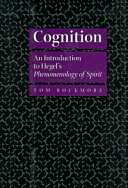 | Title: Cognition: an introduction to Hegel's Phenomenology of spirit Author: Rockmore, Tom 1942- Published: University of California Press, 1997 Subjects: Philosophy | Intellectual History Publisher's Description: Hegel's Phenomenology of Spirit , the philosopher's first and perhaps greatest work, is the most important philosophical treatise of the nineteenth century. In this companion volume to his general introduction to Hegel, Tom Rockmore offers a passage-by-passage guide to the Phenomenology for first-time readers of the book and others who are not Hegel specialists.Rockmore demonstrates that Hegel's concepts of spirit, consciousness, and reason can be treated as elements of a single, coherent theory of knowledge, one that remains strikingly relevant for the contemporary discussion. He shows how the various conceptions of cognition developed in the text culminate in absolute knowing, which Rockmore reads, in opposition to the frequent religious readings of Hegel, in a wholly secular manner. Unlike commentators who isolate Hegel's text from its philosophical origins, Rockmore analyzes the book in the philosophical context from which it emerged, lucidly discussing notoriously difficult passages in relation to the ideas of Aristotle and Descartes, and above all to those of Kant and other German idealists. [brief] Similar Items |
| 2. |  | Title: Insight and solidarity: a study in the discourse ethics of Jürgen Habermas Author: Rehg, William Published: University of California Press, 1997 Subjects: Philosophy | Law | Politics Publisher's Description: Discourse ethics represents an exciting new development in neo-Kantian moral theory. William Rehg offers an insightful introduction to its complex theorization by its major proponent, Jürgen Habermas, and demonstrates how discourse ethics allows one to overcome the principal criticisms that have been leveled against neo-Kantianism.Addressing both "commun-itarian" critics who argue that universalist conceptions of justice sever moral deliberation from community traditions, and feminist advocates of the "ethics of care" who stress the moral significance of caring for other individuals, Rehg shows that discourse ethics combines impartiality with solidarity. He provides the first systematic reconstruction of Habermas's theory and explores its relationship to the work of such contemporary philosophers as Charles Taylor. His book articulates a bold alternative to the split between the "right" and the "good" in moral theory and will greatly interest philosophers, social and legal scholars, and political theorists. [brief] Similar Items |
| 3. | 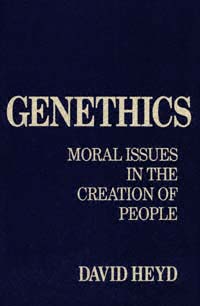 | Title: Genethics: moral issues in the creation of people Author: Heyd, David Published: University of California Press, 1992 Subjects: Philosophy | Ethics Publisher's Description: Unprecedented advances in medicine, genetic engineering, and demographic forecasting raise new questions that strain the categories and assumptions of traditional ethical theories. Heyd's approach resolves many paradoxes in intergenerational justice, while offering a major test case for the profound . . . [more] Similar Items |
| 4. | 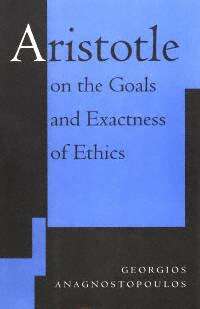 | Title: Aristotle on the goals and exactness of ethics Author: Anagnostopoulos, Georgios Published: University of California Press, 1994 Subjects: Philosophy | Classical Philosophy Publisher's Description: Philosophers as diverse as Socrates, Plato, Spinoza, and Rawls have sometimes argued that ethics can be an exact discipline whose propositions can match the exactness we associate with mathematics. Yet for Aristotle, knowledge of ethical matters is essentially inexact, and his perceptive criticisms of the Socratic-Platonic ideal of ethical knowledge and its metaphysical presuppositions remain of enduring interest to contemporary moral theorists.Georgios Anagnostopoulos offers the most systematic and comprehensive critical examination to date of Aristotle's views on the exactness of ethics. Combining rigorous philosophical argument and close analysis of the philosopher's treatises on human conduct, he gives form to Aristotle's belief that knowledge of matters of conduct, not unlike knowledge of most natural phenomena, can never be free of certain kinds of inexactness. He concludes that according to Aristotle, ethics constitutes a mode of knowledge that is neither totally nondemonstrative on account of its inexactness nor free of the important epistemological difficulties common to all nonmathematical disciplines. [brief] Similar Items |
| 5. | 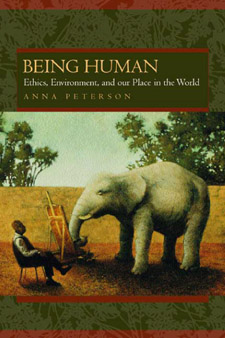 | Title: Being human: ethics, environment, and our place in the world Author: Peterson, Anna Lisa 1963- Published: University of California Press, 2001 Subjects: Religion | Folklore and Mythology | Environmental Studies | Philosophy Publisher's Description: Being Human examines the complex connections among conceptions of human nature, attitudes toward non-human nature, and ethics. Anna Peterson proposes an "ethical anthropology" that examines how ideas of nature and humanity are bound together in ways that shape the very foundations of cultures. Peterson discusses mainstream Western understandings of what it means to be human, as well as alternatives to these perspectives, and suggests that the construction of a compelling, coherent environmental ethics will revise our ideas not only about nature but also about what it means to be human. [brief] Similar Items |
| 6. | 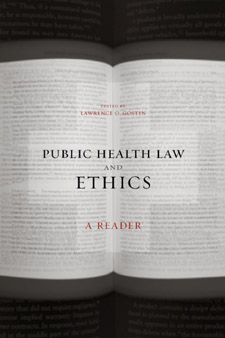 | Title: Public health law and ethics: a reader Author: Gostin, Larry O. (Larry Ogalthorpe) Published: University of California Press, 2002 Subjects: Law | Medicine | Health Care Publisher's Description: This incisive selection of government reports, scholarly articles, and court cases is designed to illuminate the ethical, legal, and political issues in the theory and practice of public health. A companion to the internationally acclaimed Public Health Law: Power, Duty, Restraint, this collection encourages debate and discourse about how courts, scholars, and policy makers respond to the salient legal and ethical dilemmas. The excerpts and commentaries in the reader analyze the legal and constitutional foundations of public health, juxtaposing them with the emerging importance of public health ethics and human rights. The book offers a systematic account of public health law, ethics, and human rights in promoting the common good. Gostin provides thoughtful commentary on the field of public health and carefully explains the meaning and importance of each selection. Scholars, legislators, and public health professionals, as well as faculty and students in schools of law, public health, medicine, nursing, government, and health administration, will benefit from the contemporary case studies covering a wide range of topics from bioterrorism to public health genetics. [brief] Similar Items |
| 7. | 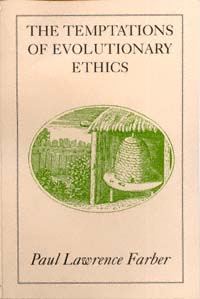 | Title: The temptations of evolutionary ethics Author: Farber, Paul Lawrence 1944- Published: University of California Press, 1994 Subjects: Philosophy | History | Ethics | History and Philosophy of Science Publisher's Description: Evolutionary theory tells us about our biological past; can it also guide us to a moral future? Paul Farber's compelling book describes a century-old philosophical hope held by many biologists, anthropologists, psychologists, and social thinkers: that universal ethical and social imperatives are built into human nature and can be discovered through knowledge of evolutionary theory.Farber describes three upsurges of enthusiasm for evolutionary ethics. The first came in the early years of mid-nineteenth century evolutionary theories; the second in the 1920s and '30s, in the years after the cultural catastrophe of World War I; and the third arrived with the recent grand claims of sociobiology to offer a sound biological basis for a theory of human culture.Unlike many who have written on evolutionary ethics, Farber considers the responses made by philosophers over the years. He maintains that their devastating criticisms have been forgotten - thus the history of evolutionary ethics is essentially one of oft-repeated philosophical mistakes.Historians, scientists, social scientists, and anyone concerned about the elusive basis of selflessness, altruism, and morality will welcome Farber's enlightening book. [brief] Similar Items |
| 8. |  | Title: Earth's insights: a survey of ecological ethics from the Mediterranean basin to the Australian outback Author: Callicott, J. Baird Published: University of California Press, 1997 Subjects: Philosophy | Anthropology | Ethics | Ecology Publisher's Description: The environmental crisis is global in scope, yet contemporary environmental ethics is centered predominantly in Western philosophy and religion. Earth's Insights widens the scope of environmental ethics to include the ecological teachings embedded in non-Western worldviews. J. Baird Callicott ranges broadly, exploring the sacred texts of Islam, Hinduism, Jainism, Taoism, Confucianism, and Zen Buddhism, as well as the oral traditions of Polynesia, North and South America, and Australia. He also documents the attempts of various peoples to put their environmental ethics into practice. Finally, he wrestles with a question of vital importance to all people sharing the fate of this small planet: How can the world's many and diverse environmental philosophies be brought together in a complementary and consistent whole? [brief] Similar Items |
| 9. | 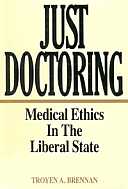 | Title: Just doctoring: medical ethics in the liberal state Author: Brennan, Troyen A Published: University of California Press, 1991 Subjects: Philosophy | Ethics | Medicine Publisher's Description: Just Doctoring draws the doctor-patient relationship out of the consulting room and into the middle of the legal and political arenas where it more and more frequently appears. Traditionally, medical ethics has focused on the isolated relationship of physician to patient in a setting that has left the physician virtually untouched by market constraints or government regulation. Arguing that changes in health care institutions and legal attention to patient rights have made conventional approaches obsolete, Troyen Brennan points the way to a new, more aware and engaged medical ethics.The medical profession is no longer isolated, even theoretically, from the liberal, market-dominated state. Old ideas of physician beneficence and altruism must make way for a justice-based medical ethics, assuming a relationship between equals more compatible with liberal political philosophy. Brennan offers clinical examples of many of today's most challenging medical problems - from informed consent to care rationing and the repercussions of the HIV epidemic - and gives his recommendation for a new ethical perspective. This lively and controversial plea for a rethinking of medical ethics goes right to the heart of medical care at the end of the twentieth century. [brief] Similar Items |
| 10. | 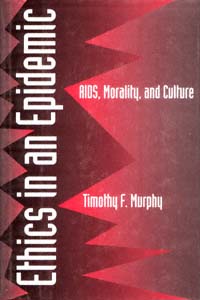 | Title: Ethics in an epidemic: AIDS, morality, and culture Author: Murphy, Timothy F 1955- Published: University of California Press, 1994 Subjects: Philosophy | Sociology | Ethics | Medicine | Social Problems Publisher's Description: AIDS strikes most heavily at those already marginalized by conventional society. With no immediate prospect of vaccination or cure, how can liberty, dignity, and reasoned hope be preserved in the shadow of an epidemic? In this humane and graceful book, philosopher Timothy Murphy offers insight into our attempts - popular and academic, American and non-American, scientific and political - to make moral sense of pain.Murphy addresses the complex moral questions raised by AIDS for health-care workers, politicians, policy makers, and even people with AIDS themselves. He ranges widely, analyzing contrasting visions of the origin and the future of the epidemic, the moral and political functions of obituaries, the uncertain value of celebrity involvement in anti-AIDS education, the functional uses of AIDS in the discourse of presidential campaigns, the exclusionary function of HIV testing for immigrants, the priority given to AIDS on the national health agenda, and the hypnotic publicity given to "innocent" victims.Murphy's discussions of the many social and political confusions about AIDS are unified by his attempt to articulate the moral assumptions framing our interpretations of the epidemic. By understanding those assumptions, we will be in a better position to resist self-serving and invidious moralizing, reckless political response, and social censure of the sick and the dying. [brief] Similar Items |
| 11. | 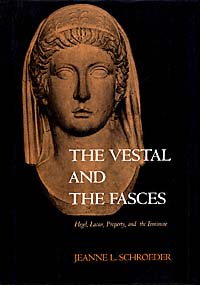 | Title: The vestal and the fasces: Hegel, Lacan, property, and the feminine Author: Schroeder, Jeanne Lorraine Published: University of California Press, 1998 Subjects: Law | Philosophy | Gender Studies Publisher's Description: In this feminist exploration of the erotics of the marketplace, Hegel's notion of property and Lacan's idea of the phallus serve parallel functions in creating the subjectivity necessary for self-actualization. Subjectivity requires intersubjective relationships mediated through a regime of possessing, enjoying, and exchanging an object of desire. For Hegel, this regime is property; for Lacan, it is sexuality, symbolized by the Phallus, which we conflate with the male organ and the female body. Property law, in Jeanne Schroeder's account, is implicitly figured by similar anatomical metaphors for that which men wish to possess and that which women try to be and enjoy. This is reflected in imagery taken from ancient Rome - the axe and bundle of sticks known as the Fasces, and the virgin priestess called the Vestal.Schroeder traces the persistence of phallic metaphors in modern jurisprudence. Rejecting the dominant schools of legal feminism, she reconceptualizes property - the legal relationship as well as its not necessarily material object - as a necessary moment in the human struggle for love and recognition. The Feminine, for Schroeder, is the radical negativity at the heart of both Lacan's split subject and Hegel's concept of freedom. Feminine emancipation and private property are, therefore, equally necessary conditions for the actualization of the free individual and the just society. Feminist scholars, social theorists, political scientists, philosophers, and lawyers will find in Schroeder's analysis scintillating new perspectives on property theory and the feminine within the market and the law. [brief] Similar Items |
| 12. | 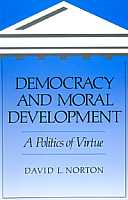 | Title: Democracy and moral development Author: Norton, David L Published: University of California Press, 1990 Subjects: Philosophy | Political Theory | Ethics Publisher's Description: At a time when politics and virtue seem less compatible than oil and water, Democracy and Moral Development shows how to bring the two together. Philosopher David Norton applies classical concepts of virtue to the premises of modern democracy. The centerpiece of the book is a model of organizational . . . [more] Similar Items |
| 13. | 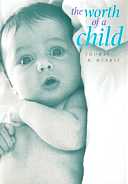 | Title: The worth of a child Author: Murray, Thomas H 1946- Published: University of California Press, 1996 Subjects: Philosophy | Ethics | Medicine | Social Problems | Public Policy Publisher's Description: Thomas Murray's graceful and humane book illuminates one of the most morally complex areas of everyday life: the relationship between parents and children. What do children mean to their parents, and how far do parental obligations go? What, from the beginning of life to its end, is the worth of a child?Ethicist Murray leaves the rarefied air of abstract moral philosophy in order to reflect on the moral perplexities of ordinary life and ordinary people. Observing that abstract moral terms such as altruism and selfishness can be buried in the everyday doings of families, he maintains that ethical theory needs a richer description than it now has of the moral life of parents and children. How far should adults go in their quest for children? What options are available to women who do not want to bear a child now? Should couples be allowed to reject a child because of genetic disability or "wrong" gender? How can we weigh the competing claims of the genetic and the rearing parents to a particular child? The Worth of a Child couples impressive learning with a conversational style. Only by getting down to cases, Murray insists, can we reach moral conclusions that are unsentimental, farsighted, and just. In an era of intense public and private acrimony about the place and meaning of "family values," his practical wisdom about extraordinary difficult moral issues offers compelling reading for both experienced and prospective parents, as well as for ethicists, social and behavioral scientists, and legal theorists. [brief] Similar Items |
| 14. | 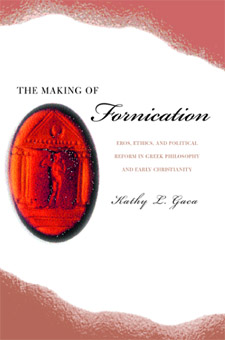 | Title: The making of fornication: eros, ethics, and political reform in Greek philosophy and early Christianity Author: Gaca, Kathy L Published: University of California Press, 2003 Subjects: Classics | Classical Philosophy | Classical Religions | Classical Politics | Christianity | Ethics | Social and Political Thought | Ancient History | Intellectual History Publisher's Description: This provocative work provides a radical reassessment of the emergence and nature of Christian sexual morality, the dominant moral paradigm in Western society since late antiquity. While many scholars, including Michel Foucault, have found the basis of early Christian sexual restrictions in Greek ethics and political philosophy, Kathy L. Gaca demonstrates on compelling new grounds that it is misguided to regard Greek ethics and political theory - with their proposed reforms of eroticism, the family, and civic order - as the foundation of Christian sexual austerity. Rather, in this thoroughly informed and wide-ranging study, Gaca shows that early Christian goals to eradicate fornication were derived from the sexual rules and poetic norms of the Septuagint, or Greek Bible, and that early Christian writers adapted these rules and norms in ways that reveal fascinating insights into the distinctive and largely non-philosophical character of Christian sexual morality. Writing with an authoritative command of both Greek philosophy and early Christian writings, Gaca investigates Plato, the Stoics, the Pythagoreans, Philo of Alexandria, the apostle Paul, and the patristic Christians Clement of Alexandria, Tatian, and Epiphanes, freshly elucidating their ideas on sexual reform with precision, depth, and originality. Early Christian writers, she demonstrates, transformed all that they borrowed from Greek ethics and political philosophy to launch innovative programs against fornication that were inimical to Greek cultural mores, popular and philosophical alike. The Septuagint's mandate to worship the Lord alone among all gods led to a Christian program to revolutionize Gentile sexual practices, only for early Christians to find this virtually impossible to carry out without going to extremes of sexual renunciation. Knowledgeable and wide-ranging, this work of intellectual history and ethics cogently demonstrates why early Christian sexual restrictions took such repressive ascetic forms, and casts sobering light on what Christian sexual morality has meant for religious pluralism in Western culture, especially among women as its bearers. [brief] Similar Items |
| 15. | 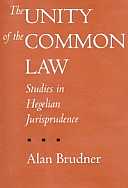 | Title: The unity of the common law: studies in Hegelian jurisprudence Author: Brudner, Alan Published: University of California Press, 1995 Subjects: Philosophy | Law | Social and Political Thought | Political Theory Publisher's Description: Countering the influential view of Critical Legal Studies that law is an incoherent mixture of conflicting political ideologies, this book forges a new paradigm for understanding the common law as being unified and systematic. Alan Brudner applies Hegel's legal and moral philosophy to fashion a comprehensive synthesis of the common law of property, contract, tort, and crime.At a time when there is a strong tendency among scholars to view the common law as essentially fragmentary, inconsistent, and contradictory, Brudner suggests instead a coherence that synthesizes several interrelated dichotomies: good-centered and right-based legal paradigms, instrumental and non-instrumental conceptions of law, externalist and internalist interpretations of the common law system, and communitarian and individualist attempts to found the legal enterprise.Brudner covers genuinely new ground through an interpretation of the common law from the standpoint of Hegelian legal philosophy. His unifying notion of common law corresponds to Hegel's notion of Geist , suggesting a designation of the mutual dependence of the community and the atomistic self for their confirmation as ends. [brief] Similar Items |
| 16. | 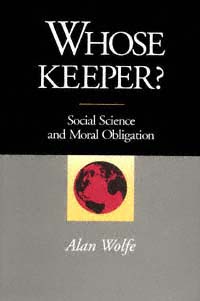 | Title: Whose keeper?: social science and moral obligation Author: Wolfe, Alan 1942- Published: University of California Press, 1991 Subjects: Sociology | Ethics | Politics | American Studies Similar Items |
| 17. | 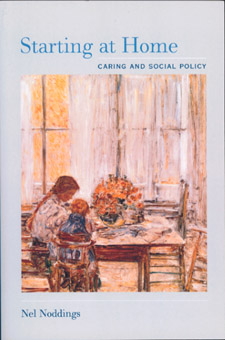 | Title: Starting at home: caring and social policy Author: Noddings, Nel Published: University of California Press, 2002 Subjects: Politics | American Studies | Anthropology | Social and Political Thought | Political Theory | Public Policy | Social Problems | Public Policy | Sociology | Sociology Publisher's Description: Nel Noddings, one of the central figures in the contemporary discussion of ethics and moral education, argues that caring--a way of life learned at home--can be extended into a theory that guides social policy. Tackling issues such as capital punishment, drug treatment, homelessness, mental illness, and abortion, Noddings inverts traditional philosophical priorities to show how an ethic of care can have profound and compelling implications for social and political thought. Instead of beginning with an ideal state and then describing a role for home and family, this book starts with an ideal home and asks how what is learned there may be extended to the larger social domain. Noddings examines the tension between freedom and equality that characterized liberal thought in the twentieth century and finds that--for all its strengths--liberalism is still inadequate as social policy. She suggests instead that an attitude of attentive love in the home induces a corresponding responsiveness that can serve as a foundation for social policy. With her characteristic sensitivity to the individual and to the vulnerable in society, the author concludes that any corrective practice that does more harm than the behavior it is aimed at correcting should be abandoned. This suggests an end to the disastrous war on drugs. In addition, Noddings states that the caring professions that deal with the homeless should be guided by flexible policies that allow practitioners to respond adequately to the needs of very different clients. She recommends that the school curriculum should include serious preparation for home life as well as for professional and civic life. Emphasizing the importance of improving life in everyday homes and the possible role social policy might play in this improvement, Starting at Home highlights the inextricable link between the development of care in individual lives and any discussion of moral life and social policy. [brief] Similar Items |
| 18. | 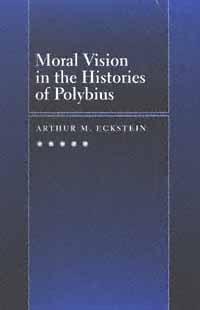 | Title: Moral vision in the Histories of Polybius Author: Eckstein, Arthur M Published: University of California Press, 1995 Subjects: Classics | History | Classical Politics | Political Theory | Ancient History Publisher's Description: Arthur Eckstein's fresh and stimulating interpretation challenges the way Polybius' Histories have long been viewed. He argues that Polybius evaluates people and events as much from a moral viewpoint as from a pragmatic, utilitarian, or even "Machiavellian" one. Polybius particularly asks for "improvement" in his audience, hoping that those who study his writings will emerge with a firm determination to live their lives nobly. Teaching by the use of moral exemplars, Polybius also tries to prove that success is not the sole standard by which human action should be judged. [brief] Similar Items |
| 19. | 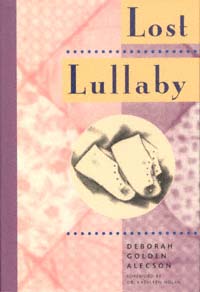 | Title: Lost lullaby Author: Alecson, Deborah Golden 1954- Published: University of California Press, 1995 Subjects: American Studies | Gender Studies | Women's Studies | Medicine | Ethics | Sociology Publisher's Description: Lost Lullaby makes one think the unthinkable: how a loving parent can pray for the death of her child. It is Deborah Alecson's story of her daughter, Andrea, who was born after a full-term, uneventful pregnancy, weighing 7 pounds 11 ounces, perfectly formed and exquisitely featured. But an inexplicable accident at birth left her with massive and irreversible brain damage. On a vitality scale of one to ten, her initial reading was one. And so begins Deborah Alecson's heart-rending struggle to come to terms with two desperately conflicting and powerful emotions: her desire to nurture and love Andrea, and her desire to do everything in her power to bring about her death.Told in a mother's voice, with a simplicity and directness that heighten the intensity of the drama that unfolds, Lost Lullaby reaffirms the human dimension of what is too often an abstract and purely theoretical discussion. During the two months that Andrea spent in the Infant Intensive Care Unit, Ms. Alecson spoke with lawyers, doctors, and ethicists in an effort to understand the legal, medical and ethical implications of her plight. She recounts those discussions and describes legal cases that have a direct bearing on her own situation. Her battle - both in coming to the agonizing decision to let her child die and in convincing the medical and legal establishments to respect that decision - will engender empathy for the plight of many families, and an awareness of the need to use medical technology with restraint. It is a must-read for everyone who cares about how we make life-and-death decisions on these new medical, legal, and moral frontiers. [brief] Similar Items |
| 20. | 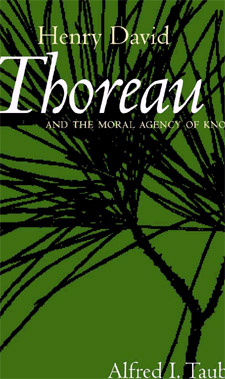 | Title: Henry David Thoreau and the moral agency of knowing Author: Tauber, Alfred I Published: University of California Press, 2001 Subjects: Philosophy | Literature | History and Philosophy of Science | Ethics Publisher's Description: In his graceful philosophical account, Alfred I. Tauber shows why Thoreau still seems so relevant today - more relevant in many respects than he seemed to his contemporaries. Although Thoreau has been skillfully and thoroughly examined as a writer, naturalist, mystic, historian, social thinker, Transcendentalist, and lifelong student, we may find in Tauber's portrait of Thoreau the moralist a characterization that binds all these aspects of his career together. Thoreau was caught at a critical turn in the history of science, between the ebb of Romanticism and the rising tide of positivism. He responded to the challenges posed by the new ideal of objectivity not by rejecting the scientific worldview, but by humanizing it for himself. Tauber portrays Thoreau as a man whose moral vision guided his life's work. Each of Thoreau's projects reflected a self-proclaimed "metaphysical ethics," an articulated program of self-discovery and self-knowing. By writing, by combining precision with poetry in his naturalist pursuits and simplicity with mystical fervor in his daily activity, Thoreau sought to live a life of virtue - one he would characterize as marked by deliberate choice. This unique vision of human agency and responsibility will still seem fresh and contemporary to readers at the start of the twenty-first century. [brief] Similar Items |